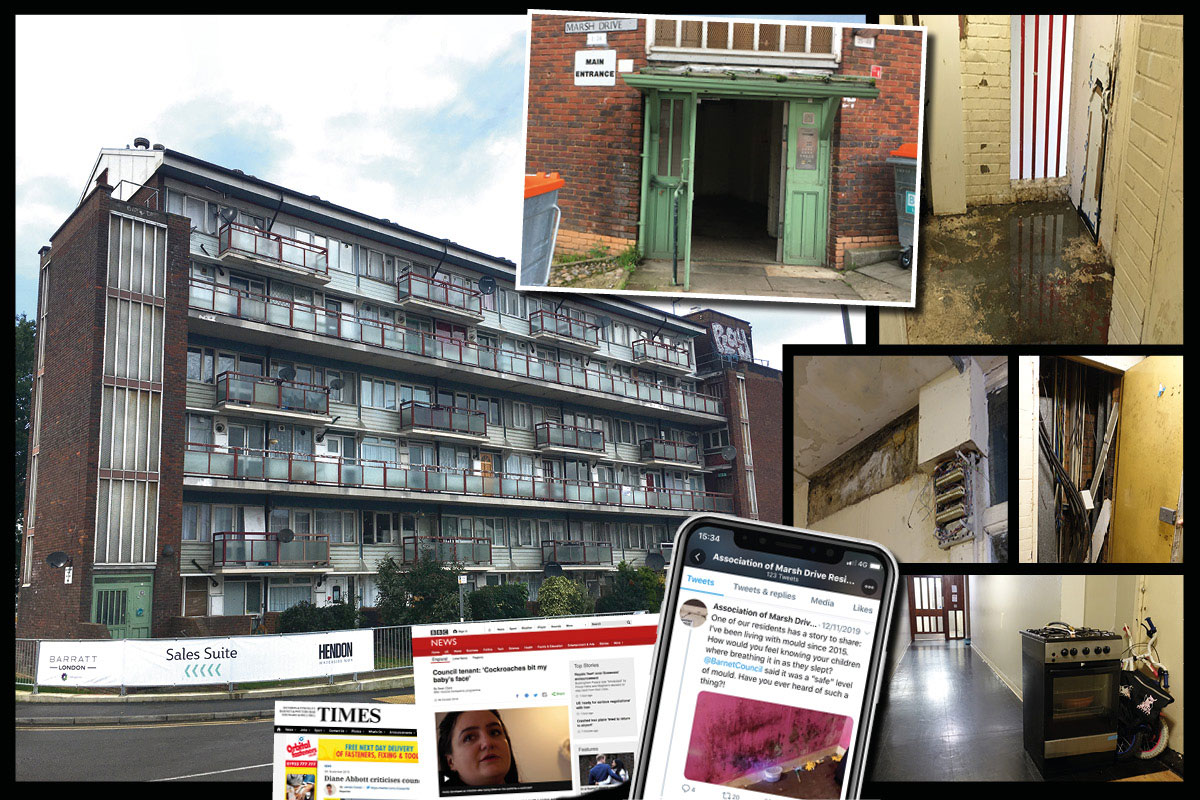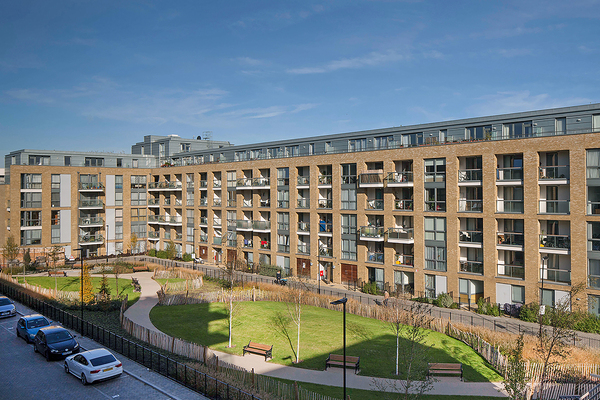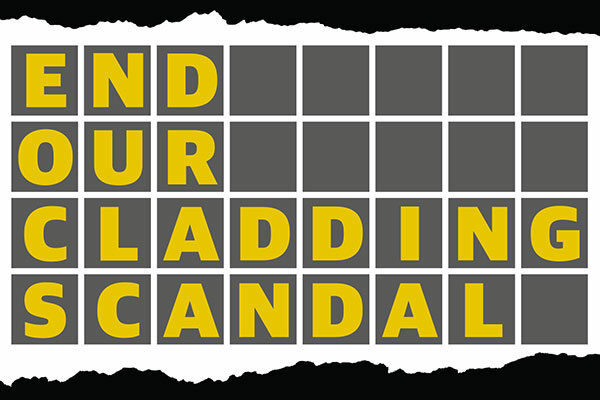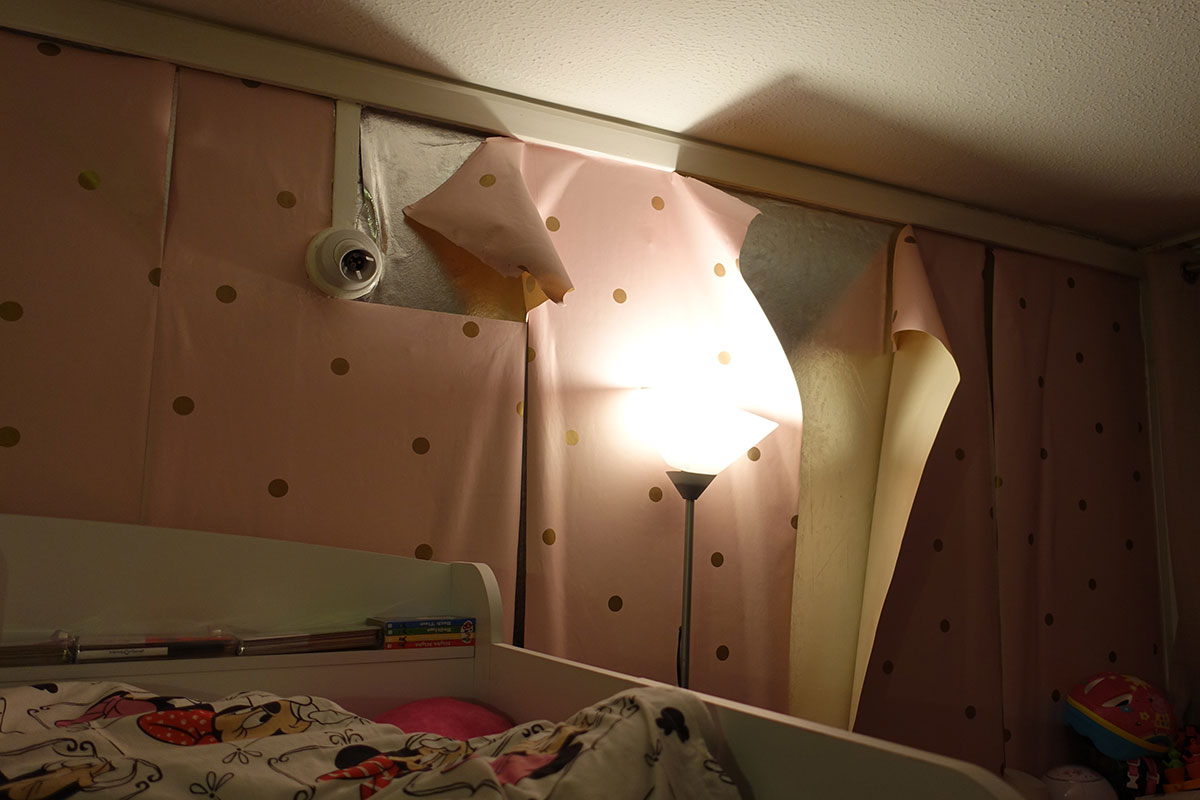You are viewing 1 of your 1 free articles
The story of a neglected block
Residents at Marsh Drive have been left to live in unsanitary conditions. Nathaniel Barker visits Barnet to find out what lessons can be learned from the saga
Marsh Drive sits forlorn and shabby off West Hendon Broadway in Barnet, north London. Consigned to demolition some 18 years ago, it is the last original block on the West Hendon Estate and cuts a lonely figure next to the new Barratt-built homes.
Six storeys tall and W-shaped, it is a sizeable building containing 232 flats. However, until last summer, Marsh Drive had been largely neglected. Then, residents who were angry about the block’s management began to organise, resulting in significant media coverage – most notably a segment on BBC Two’s Victoria Derbyshire programme.
Some of the complaints were shocking, including a baby being bitten on the eye by cockroaches.
A clip from the segment was watched well over a million times on Twitter. It included Brian Coleman, former Conservative mayor of Barnet, sitting next to the bitten baby’s mother and saying: “The council owes them nothing at all.”
No social landlord wants this kind of attention, particularly with the sector’s reputation under the spotlight since the Grenfell Tower fire. The story of Marsh Drive provides practical lessons about how to do better at maintenance, regeneration, allocations and resident engagement.
“They’re going to take your whole life, and your children’s lives, and it’s in their hands and you have no control”
Before the residents’ campaign, the block was set to be emptied by 31 October 2021, but Barnet Council and its ALMO, Barnet Homes, have recently decided to move that date forward one year in light of its poor condition. The council has given residents notices to quit, and is now assessing each household’s priority entitlement for rehousing.
“They rattled people with that,” says Simone (who preferred not to give her full name), a young mum who has lived in the block for four years. It was, she says, a reminder that “they’re going to take your whole life, and your children’s lives, and it’s in their hands and you have no control”.
However, a series of delays common to large-scale estate regenerations, and exacerbated by the economic crash, meant that planning permission was not granted until 2013, while the compulsory purchase order affecting Marsh Drive was only secured in September 2019. Demolition is now due to start in April 2022.
As a result, most council tenants in the block – 121 of 146 households not including leaseholders and property guardians – have non-secure tenancies. These are overwhelmingly people who have presented to the council as homeless and been given temporary accommodation at Marsh Drive.
The major difference between secure and non-secure tenants for the purposes of regeneration is that the latter will not be offered homes in the new development and will instead be moved to alternative accommodation, possibly outside the borough.
“We’ve apologised that some of the conditions there aren’t acceptable,” says Tim Mulvenna, chief executive of Barnet Homes.
There is no question that the communal areas in Marsh Drive are unpleasant. Outdoor walkways are covered in bird muck. Jagged cracks punctuate the walls. Cupboards marked “danger” are rotting and unlocked. Broken door-entry systems mean anyone can walk into the block, and they do; evidence of rough sleepers and drug users is everywhere, while residents say break-ins are a major problem.
Mr Mulvenna claims that most flats in the block are in good condition and that there are not a disproportionate number of complaints or outstanding repairs at Marsh Drive. It is true that the flats themselves have received only slightly less investment than the rest of the council’s 10,000-home stock over the past five years – £8,500 per flat on average compared with £8,700, according to a Freedom of Information Act request by Inside Housing. However, residents are concerned that their complaints do not always register.
“They pass you from one person to another person, and it’s like the information goes missing,” says Ilias Hussein. His family of seven is crammed into a two-bedroom flat. Annie Barrett, the mother whose baby was bitten by a cockroach, claims that she has had more than 25 call-outs for pest problems in her four years at Marsh Drive, but a subject access request response recorded just one.
It was Ms Barrett who began the work to form the Association of Marsh Drive Residents, which led to the BBC coverage and a public meeting with Barnet officials in September that was attended by around 60 people. Since then, Barnet Homes has clearly made an effort to improve conditions.
Tim Mulvenna, chief executive of Barnet Homes, says the ALMO has apologised to tenants
However, residents still have real concerns about safety. Marsh Drive is a large panel system block with a piped gas supply. A structural assessment completed by Ridge and Partners in December and seen by Inside Housing concluded that this fact means the building is “inadequately robust to prevent disproportionate collapse in the event of an internal gas explosion”.
Barnet Homes is now scrambling to install gas interrupters and replace all residents’ gas cookers at significant cost. Removing the gas supply and boilers is not considered realistic in Marsh Drive’s remaining life span, so gas company Cadent has ordered monthly gas safety checks at each home.
Fire risk assessments (FRAs) carried out in June and October found that there was “no evidence of communication to the resident of what to do in the event of fire”. This was also highlighted on the previous FRAs in 2017, with Barnet Homes blaming vandalism for the issue reoccurring.
“It’s not worth doing; it would take longer than the year we’ve got to decant the block”
New notices read: “If the fire is not in your flat, you may be safer to stay inside, close all windows, block gaps under doors and be prepared to leave.” Barnet Homes says that this rather confusing advice represents a “stay safe” policy, in line with one FRA’s recommendation.
The FRAs listed the broken door-entry systems as a substantial arson risk and said they should be fixed within one year. No one Inside Housing spoke to can remember a time when they were working, and it appears to be residents’ number one maintenance concern.
Cost concerns have prevented this work from being done previously, Mr Mulvenna explains: “I think if we could rewind the clock, yes, that system would have been dealt with some time ago.”
They will not be repaired, he says, because “it’s not worth doing; it would take longer than the year we’ve got to decant the block”. Instead, Barnet Homes has installed night-time security patrols – which are themselves hugely expensive, and which residents say leave their homes vulnerable during working hours.
The poor conditions extend inside Marsh Drive residents’ homes
Barnet Homes was able to identify only £2.8m in capital spending on Marsh Drive since it was consigned to demolition, the bulk of which went on electrical works completed in 2015.
It is difficult not to interpret all this as historical maintenance failure that has left Marsh Drive in a bizarre catch-22 situation, where huge resources are being poured in during its final months of use to make up for years of under investment.
“I wasn’t expecting the level of anger, frustration, the number of people who were at that meeting”
Unsurprisingly, relations between the non-secure tenants and their landlord are strained. “Barnet are absolutely disgraceful in how they treat people here,” Simone says, shaking her head.
Mr Mulvenna admits that he was “taken aback” at the above-mentioned September meeting. “I wasn’t expecting the level of anger, frustration, the number of people who were at that meeting,” he reflects, pointing to two errors: not enough resources being allocated to the block, and communication being too focused on leaseholders and secure tenants, leaving non-secure tenants feeling “marginalised”.
It is clear that Mr Mulvenna wants to rebuild trust, but there is a long way to go and the council’s approach has not always been helpful. Residents angrily claim that Dan Thomas – the council’s leader – has ignored their emails and requests for a meeting.
In an astounding recording from a general election event in December heard by Inside Housing, Helene Richman, a Conservative councillor for West Hendon and a barrister specialising in property law, can be heard telling Simone: “We don’t want to pay for you to live for free your whole life because you don’t have a job… move someplace cheaper.”
When contacted, Ms Richman said: “I am of course very sorry for any offence that may have been taken to the recorded comments, which do not reflect how seriously I continue to take the concerns raised by the residents of Marsh Drive. As well as not representing my views, the comments in this recording do not represent the position of the council.”
A spokesperson for the council said: “The council takes its responsibilities for ensuring families are housed in suitable accommodation extremely seriously and we will continue to work with, and listen to, the residents of Marsh Drive.”
Residents Simone, Annie, Catherine and Ilias
This difficult relationship between the residents and the council will only make the tricky business of assessing and rehousing the residents even thornier. The non-secure tenants we speak to are highly suspicious of the council. They want assurances that they will all be given top-band priority for rehousing and offered secure tenancies.
Mr Mulvenna says it is likely that around 60% will qualify and mostly be placed in housing association homes, but not all. Some could be moved to temporary accommodation outside Barnet, or even London.
“What people want is certainty about what’s going to happen to them,” he acknowledges. “And the reality is we can’t give people en masse certainty about what’s going to happen to them, and until individuals get that certainty, that overall feeling of distrust and anxiety is likely to remain.”
“The reality is we can’t give people en masse certainty about what’s going to happen to them, and until individuals get that certainty, that overall feeling of distrust and anxiety is likely to remain”
Barnet’s allocations policy will play a role. The council splits people into four priority bands. Those who do not make a “community contribution” – that is, who are not working, volunteering or in education for an average of 64 hours a month – are placed in a lower band, meaning they will likely be offered a private rented home that may be outside the
borough.
Then, of course, there is the cruel nature of London’s housing crisis.
“We can’t look at Marsh Drive in isolation – we have 2,500 families in temporary accommodation, we have significant numbers of people presenting as homeless to us every day, and so when we weigh up people’s housing options we have to do it in the context of everybody who requires housing,” Mr Mulvenna says. “So sometimes you want to
provide an emotional response to people but actually it feels quite bureaucratic, and that’s unfortunate and a difficult message to deliver, but it’s the only really fair way of dealing with it when you’ve got such levels of demand and such little supply.”
Marsh Drive is a grim microcosm for London’s failing housing system. There are wider issues at play here that could sustain articles in their own right, particularly the temporary accommodation structure, which leaves people languishing in squalid conditions indefinitely.
Mr Mulvenna insists Barnet Homes is learning lessons from Marsh Drive. For instance, at Grahame Park – another, less progressed large estate regeneration – it will fix the broken doors, engage people earlier, and avoid moving non-secure tenants there to other regeneration sites.
It is vital that social landlords take note of these cautionary tales. Like at Grenfell Tower, avoidable errors left Marsh Drive’s residents feeling ignored and vilified. Being the stewards of vulnerable people’s homes is an incredibly demanding charge. The acute challenges of the housing crisis make getting the job right harder, but even more essential.














